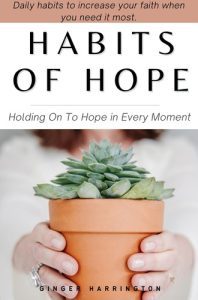Gratitude isn’t just about saying thank you—it’s a transformative practice that reshapes our lives and renews our hope. In a world where anxiety and stress frequently overwhelm us, learning to focus on gratitude can profoundly impact our emotional and spiritual well-being.
This post and the accompanying podcast episode explore why gratitude matters more than you think, how it connects to hope, and how to be more grateful every day.
Though I work at being a grateful person, sometimes I get snowballed under all the things—the anxiety, the to-do list, the overwhelm. It’s easy to forget to pause and give thanks, as complaining often seems more intuitive than expressing gratitude. Can you relate to this struggle? This is exactly why gratitude is vital—it requires intention and practice to build a habit that enables us to access hope through thankfulness.

This is why we gratitude matters. It takes intention and practice to build a habit that enables us to access hope through gratitude and thankfulness. The daily is where habits are formed, is where we shape our patterns and our rhythms.
Maybe you feel a little uncomfortable with the word “habit.” However, I’ve learned to see habits as beneficial frameworks that help us achieve goals and live fully in our identity in Christ. The habit of gratitude, shifts our focus to our blessings and what God is actively doing in our lives. It affects us on multiple levels—from our brain chemistry (neuroplasticity) to our spiritual perspective, altering our outlook and encouraging a thankful mindset.
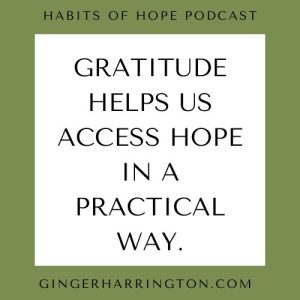
Rely on the Holy Spirit to Cultivate a Grateful Heart
Sometimes we really struggle to feel grateful. When I’m stuck in anxiety or feeling overwhelmed, it’s hard to be grateful. It can feel like I’m going through the motions, not from my heart.
Gratitude doesn’t always come easily, especially when overwhelmed with negative emotions. We don’t have to grit our way to gratitude on our own. But here’s the good news: the Holy Spirit is our helper in this journey. When gratitude feels out of reach, I try to remember to surrender these feelings to the Lord, asking Him to foster thankfulness in my heart. This partnership with the Holy Spirit transforms our efforts and makes the practice of gratitude a shared spiritual journey rather than a solitary struggle.
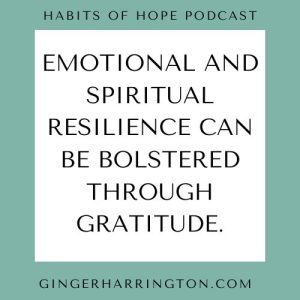
Gratitude Matters Because It’s a Bridge to Hope and Peace
Gratitude is more than just acknowledging the good; it’s about discovering light even on our darkest days. Biblical hope is defined as a “confident expectation of what God has promised,” and its strength lies in His faithfulness (Online Wiley Library). It’s deeply intertwined with faith—not contingent upon the amount we possess but rather on God’s steadfast presence.
My co-host, Larissa Traquair, often says, “We aren’t merely hoping as though tossing pennies in a wishing well; we place our confident hope in the God of the universe, promised through Jesus.” This profound truth reassures us that even in our worst moments, the living hope of Christ within us prevails.
Even on our worst days and hardest times, we have hope because of the life, the ever-living hope of Christ within us.
It’s easy to see gratitude and grief as either or type of thing because we’re defining so many of these words with our emotions, how we feel. When we feel grief or hopelessness or sorrow, we don’t feel grateful. We don’t feel hopeful in that moment.
We can weep and be grateful at the same time. We can grieve and have hope at the same time.
Hope and grief, gratitude in the hard can co-exist when we hang onto the truth that God present and faithful. He’s always good, even in the moments that aren’t good. We can have experience our emotions, but our heart and mind stay connected to hope. Like parallel train tracks, they run side by side. Even though our emotions might be sorrowful, we can still be grateful. We can still have hope even though our emotions may feel grateful in the moment.
Gratitude Has the Power to Change our Mindset
Cultivating gratitude daily feeds our hope by shifting our attention to what is true, honorable, and praiseworthy. This connection between gratitude and hope is crucial in maintaining emotional balance and overcoming anxiety. Gratitude has the power to transform stress into serenity by refocusing our thoughts on what we have, rather than what we lack.
Gratitude changes our thought patterns and reminds us of God’s faithfulness, helping us to rise above daily irritants and see the bigger picture of God’s presence in our lives.
Daily expressions of gratitude do more than just lift our spirits; they realign our focus towards what is true, honorable, and praiseworthy. This practice not only maintains our emotional balance but also combats anxiety by transforming stress into serenity. As Apostle Paul advises, we should fix our thoughts on things that are admirable and worthy of praise (Philippians 4:8).
In her book Switch on Your Brain, Dr. Caroline Leaf discusses how our thoughts form our attitudes and, ultimately, our life quality. She notes, “The process of thinking and choosing is the most powerful thing in the universe after God…” (p.103). Recognizing this power, we learn the importance of consciously directing our attention to the positive aspects of our lives. (affiliate link)
Paying attention to the good things in our lives is part of the process. You can’t be grateful for the blessings you don’t notice. This verse reminds us of the importance of choosing our thoughts with purpose. Our mindset is key to cultivating a grateful heart.
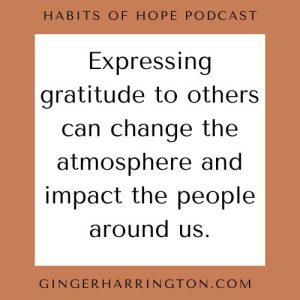
How to Be More Grateful
Cultivating gratitude doesn’t require grand gestures. Small, consistent actions can lead to significant changes in how we view our world and cope with stress. Which of these simple practices could help you strengthen the habit of thankfulness in your life?
- Morning Reflections: Begin your day by listing three things you’re thankful for, setting a positive tone for the day ahead.
- Mindful Appreciation: Throughout your day, take moments to appreciate the small joys—whether it’s a delicious cup of coffee, a call from a friend, or simply a moment of quiet.
- Gratitude Journal: End your day by writing down your experiences and why they mattered. This helps embed gratitude deeply into your lifestyle.
- Daily Reminders: Set reminders to pause and find something to be grateful for throughout the day.
- Volunteer or Help Others: Giving back can significantly boost your feelings of gratitude as you make a tangible difference in others’ lives.
- Practice Gratitude in Tough Times: Find something to be thankful for even during difficult situations—this can shift your outlook and emotional response.
- Express Gratitude to Others: Change the atmosphere around you and impact others by expressing gratitude openly and often.
Embrace Gratitude, Transform Your Life
Challenge yourself to identify and appreciate one thing each day this week and notice how your perspective begins to shift. Embracing gratitude isn’t always our first response, but it’s achievable with intention and practice. Acknowledge the difficulties without letting them overshadow the good in your life. Each act of thankfulness is a step towards overcoming hurdles with a resilient and hopeful heart.
Ready to dive deeper into how gratitude can change your life? Listen to the podcast episode or watch the video for more insights on why gratitude matters. Join us on this journey and let gratitude transform your spirit, mind, and heart.
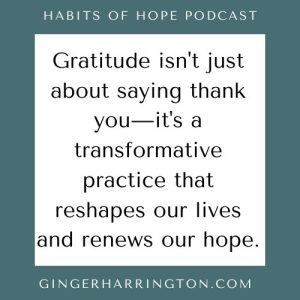
Podcast Show Notes
Discover the life-changing benefits of gratitude to fuel more hope in your life. Learn how embracing gratitude not only shifts your perspective but also strengthens your connection with God, infusing your life with hope during everyday challenges. We’ll share practical steps to foster a habit of thankfulness, touching personal stories, and insights into how this simple practice can bring peace amid chaos. Tune in to discover the key to a life filled with joy and hope through the power of gratitude. Join us for a heartwarming conversation to cultivate the power of gratitude in your life.
Gratitude profoundly reshapes our spiritual journey and daily interactions, emphasizing what truly matters in our lives.
- Gratitude helps us access hope in a practical way.
- Our hope is alive and active because it is anchored in the life and resurrection of Jesus Christ, who is our Living Hope (1 Peter 1:3).
- Hope does not fade or die but persists through all circumstances because it is grounded in the eternal and unchanging nature of Christ Himself.
- Gratitude changes our thought patterns and reminds us of God’s faithfulness.
- Gratitude can shift our attention to God’s blessings, changing our neuroplasticity and spiritual perspective.
- Hope, deeply rooted in God’s faithfulness, is not mere wishful thinking but a confident expectation of His promises
- We can weep and be grateful at the same time, and grief and hope can coexist.
- Emotional and spiritual resilience can be bolstered through gratitude.
- Personal stories of how gratitude has helped us navigate difficult times and find hope.
- The habit of gratitude is formed by daily intentional choices to express gratitude.
- We can rely on the Holy Spirit to help us access hope through the consistent practice of gratitude.
- Giving thanks daily and journaling three things to be grateful for can help develop a habit of gratitude.
- Expressing gratitude to others can change the atmosphere and impact the people around us.
- Focusing on what is good, true, right, and praiseworthy can shift our attitudes and bring peace.
- Prayer is essential in cultivating gratitude and inviting God’s transformation in our lives.
How to Be More Grateful to Cultivate a Grateful Heart
One of the most downloaded resources in The Deeper Life Collection, this printable PDF will help you cultivate the habit of gratitude in a fun and easy way. Discover the difference gratitude will make in your life when you work through this practical resource. The Deeper Life Collection is a private library of resources available to Ginger’s email subscribers.
Previous Post
Why Trusting God in the Moment Helps Us Overcome Worry and Fear
Related Blog Posts on Gratitude and Thanksgiving
- Gratitude Matters: 10 Truths and Tips for a Grateful Life
- Celebrate Gratitude with Ginger and Larissa
- Thanksgiving is More Than a Holiday: A Moment for Gratitude
- Pondering Gratitude


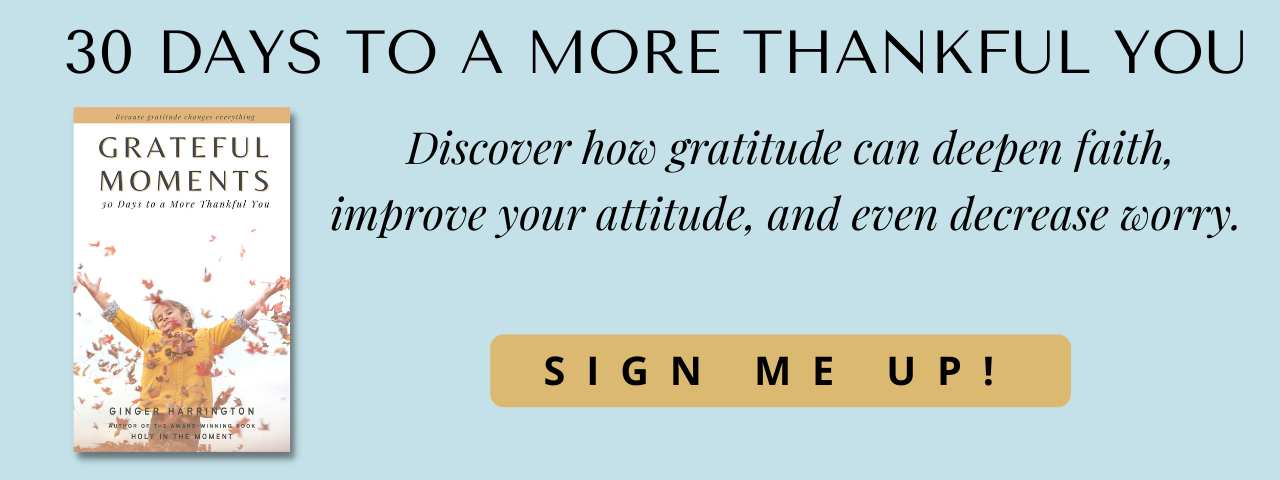
 So glad you're here. I help busy women—gals like you— build healthy habits for living well with biblical wisdom and practical steps to deepen your faith, increase your hope, and thrive in your purpose.
So glad you're here. I help busy women—gals like you— build healthy habits for living well with biblical wisdom and practical steps to deepen your faith, increase your hope, and thrive in your purpose.

